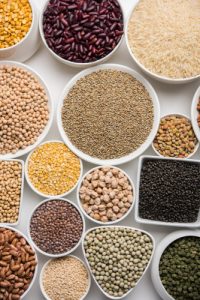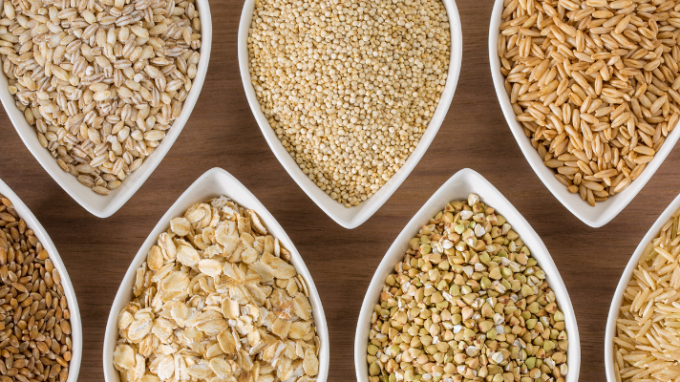There’s no doubt, dietary and nutritional habits can significantly affect how the body functions, and have a big impact on fertility and reproductive health. Infertility can be a frustrating journey and the untold stories of having repetitive negative pregnancy tests are a bitter pill to swallow. Therefore, it can be essential for couples trying to conceive (TTC) make careful modifications to positively support their fertility health and making diet changes are just one aspect of working toward increasing the chance of getting pregnant. While looking into fertility-boosting foods, many dietary habits are known to increase the chances of conception. Omega-3 rich foods, lean meats, healthy fats, organic berries, and unrefined carbs can all make a difference, but one exceptionally helpful option is focusing on whole grains.
Studies have revealed that intake of whole grains, such as whole wheat flours, bulgur wheat, brown rice, buckwheat, popcorns, and psyllium may increase the rate of live births in women receiving fertility treatment. The breakdown to how these whole grain choices impact the body and fertility is multi-faceted.
When it comes to the positive impact of whole grains on fertility, the impact is founded on the nutrient-packed content of these whole grains. Whole grain kernels contain three parts: the bran (outer layer of the grain), endosperm (the middle starchy carbohydrate layer), and the germ (the nutrient-packed core of the grain). Each section houses health-promoting nutrients, however the bran is particularly nutritious with a fiber-rich outer layer that supplies B vitamins, iron, copper, zinc, magnesium, antioxidants, and phytochemicals.
Whole Grains are Fiber-Rich
Fiber is universally known to aid in controlling exaggerated swings in hormonal levels and excess hormone production. In addition, regular fiber intake can help regulate blood sugar. Whole grains are rich in fiber, and thus, can help reduce excess estrogen or other fertility-hindering levels of hormones in the body. Studies have found that fiber-rich diets can significantly reduce the risks of infertility and cases of anovulation.
Whole Grains are Rich in B-Vitamins

This high b-vitamin and B6 content has been found to help reduce infertility by keeping estrogen and progesterone at appropriate levels, increasing production of cervical mucus, and strengthening the luteal phase- increasing the receptivity of the uterus for conception by strengthening the uterine wall.
Whole Grains Contain Useful Antioxidants
Also found in the bran of whole grains is a high source of antioxidants, which aid in the neutralization of the negative impacts of many free radicals. Therefore, they can increase egg quality and result in more regular ovulation cycles. While antioxidants should be a part of women’s regular fertility diet, the benefits are not isolated to just women. Studies have linked reduced antioxidant intake in the diet to lower semen quality, while respectively finding that higher antioxidant intake in the diet can neutralize oxidative stress and leads to improved sperm health and higher conception success.
Regulation of Insulin Levels
This notion that whole grains can significantly impact insulin levels was identified in research published in The American Journal of Clinical Nutrition, and studied the effect of whole grains on insulin sensitivity in overweight hyperinsulinemic adults. The results of the study found that consumption of a refined-grain diet (one high in white bread, white rice, etc.) can cause spikes in blood sugar levels, ultimately increasing the risk of type 2 diabetes and ischemic heart disease, altering the body’s hormones and thus, impacting women’s ovulation cycles.
Unlike refined grains, whole grains and whole-food meals provide the body with an energy source that slowly breaks down and processes in the body. This slow breakdown controls the production and presence of insulin and sugar levels, which means less blood sugar spikes. By limiting and avoiding these spikes, women can improve their fertility and overall health, since there are fewer hormone disruptions and fewer interruptions in the ovulation cycle.
Whole Grain and Your Reproductive Health
As previously mentioned, grain is rich in phytonutrients and antioxidants, making it a vital asset to regulating hormones. In addition to the aforementioned b-vitamins, whole grains also provide good sources of vitamins A and E, which help improve female and male fertility.
Infertility is one of the common problems that many couples face today and more and more research finds that those who consume whole grains regularly have improved fertility health and underlying health overall, when compared to those who don’t eat whole grains at all.
The nutrient-rich whole grain food options can have a nutrient-advantage of helping maintain healthy sperm levels and motility, balancing hormones, regulating the menstrual cycle and even reducing abdominal pain during periods.
Regardless of whether fertility improvement is the primary goal or an afterthought, daily intake of whole grains has a beneficial role on the body for numerous reasons. From reducing weight and obesity-related issues, helping in reducing the risk of cancers, decreasing the risk of erectile dysfunction, to regulating blood sugar levels and helping maintain healthy testosterone levels, it is evident that whole grains should be a common dietary choice, especially for couples trying to conceive.




